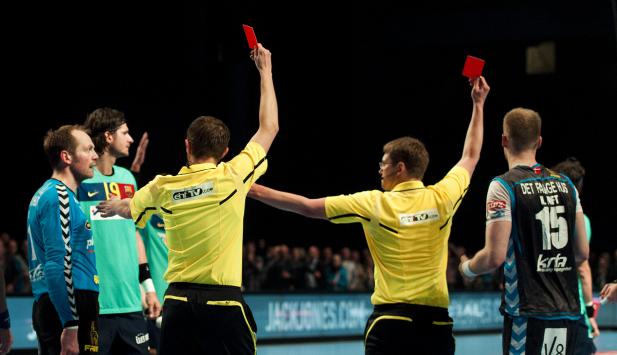There have been too many instances recently, where a red card has led to post-match uncertainty, disputes and improper handling of the matter. Mostly, because these are the situations which are given more publicity, it involves EHF competition, but I have information that similar problems seem to exist in national federations, for instance in Germany. This is very regrettable, because players and clubs should be able to count on predictability and consistency; it is also largely unnecessary, because the basic IHF Playing Rules, which MUST be respected by all continental and national federations, offer both clarity and limits regarding the post-match handling of a disqualification (‘red card’)!
The 2010 playing rules make a very important distinction between the ‘basic’ disqualification due to a foul or unsportsmanlike conduct (rules 8:5 and 8:9 respectively) and the more dangerous fouls and serious conduct (rules 8:6 and 8:10 respectively) where the referees are required to send a report to the organizing federation regarding the disqualification. The important point here is that the referees are the ONLY ones, using their subjective judgment on the basis of existing criteria, who have the prerogative to decide if a foul falls under rule 8:5 or 8:6 and if a misconduct falls under 8:9 or 8:10. Moreover, this decision must be taken immediately by the referees at the time of the incident, and they are obliged to inform the team immediately, if their decision is to classify the action under 8:6 or 8:10.
This means that if the referees have given a red card and have concluded that 8:5 or 8:9 applies, meaning that no report is to be sent to federation, this is the END of the matter. The federation has NO right to override the judgment of the referees and take upon itself to decide about a further suspension. Indeed, one of the fundamental reasons for the distinction between ‘disqualification without report’ and ‘disqualification with report’ is precisely to avoid any uncertainty regarding the player’s status for future games and to prevent the possibility of capricious and inconsistent bureaucratic action. Presumably, it can only be ignorance or arrogance that causes the federations to ignore what the playing rules prescribe, and it is regrettable that the IHF turns a blind eye to these improper practices!
In those cases where there referees do submit a report, because a disqualification falls under rules 8:6 or 8:10, there are sometimes some misunderstandings, both among the responsible federations, and among the general public. The purpose of the report is to enable the federation to determine IF there should be further consequences and if so to what extent. In other words, a suspension is NOT automatic and mandatory just because a report has been filed. It is always up to the respective federation to apply its own principles, guidelines and procedures. Here they have a complete prerogative and are not under the jurisdiction of the IHF. Culture and traditions may impact the decision-making, and this may vary from country to country.
Of course, this does not mean that one does not want to see consistency and a clear logic in the decision-making WITHIN each federation. On the one hand, similar cases need to be treated in a similar way, so standardization is important. On the other hand, there must also be flexibility to make a distinction between cases that are not quite similar, or where the seriousness of the action varies, so one must guard against any tendencies to a ‘robotic’ decision-making. It also needs to be recognized that it is in fact difficult to compare and get consistency between entirely different types of cases. For instance, what is fair and consistent if one compares dangerous and reckless fouls that may lead to injuries, with grossly unsportsmanlike behavior that does not physically hurt anyone but may have a direct impact on the result of a game?
One particular situation, which unfortunately arises far too often, is the special case of illegally preventing the opponents from resuming the game or getting to a scoring chance during the LAST MINUTE of the game. Clearly, the reason why this, by definition, has been placed in the category of ‘disqualification WITH report’ is the desire to go as far as possible in discouraging this kind of cynical action, which is really bad for the spirit and the image of our game, especially if it does have its intended effect during the game. When the rule was introduced, attempts were made to tie the rule and the punishment not just to the ‘last minute’ but also to the notion of having a potential effect on the outcome.
Clearly there is a difference between situations where everyone knows that ‘the next goal will decide’, and situations where it is either impossible to know whether the next goal is so important or where it is clear that is UNimportant (and the action is really a case of sheer stupidity). It is also relevant whether the cynical player commits the action in a way that is at least physically harmless or whether the cynicism includes subjecting the player to physical danger. But despite these differences, the federations tend to be ‘on autopilot’ when giving out suspensions: for the EHF, one game seems to have become the standard. Here it would be appropriate to increase the length in those cases where the awareness of the impact was clear and/or there was reckless physical action involved. As it now is, many players and teams laugh at the ‘price’ of ONE game.

